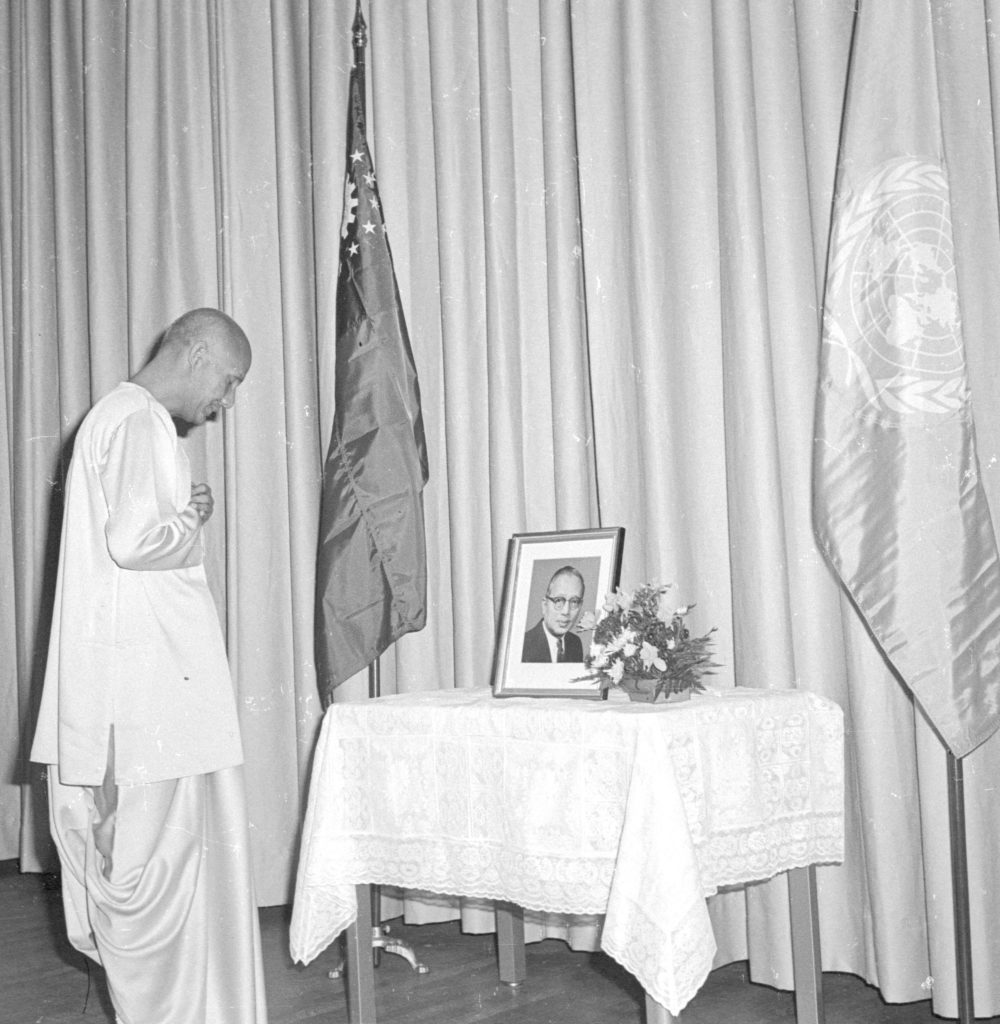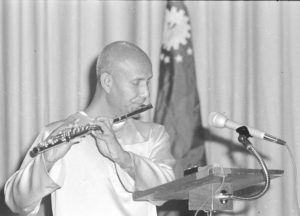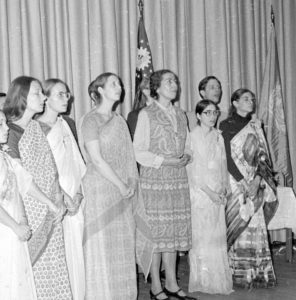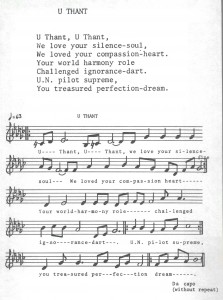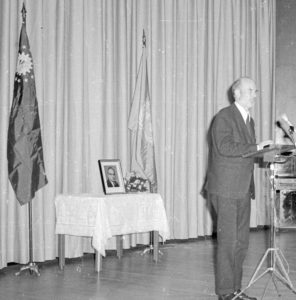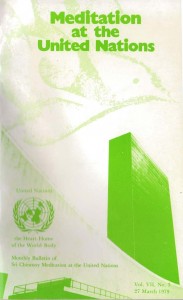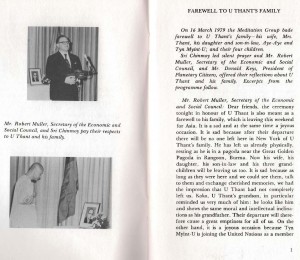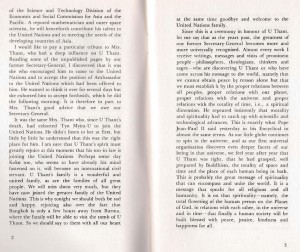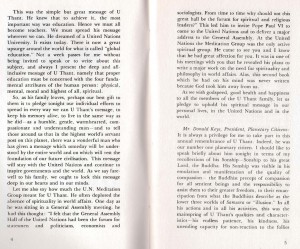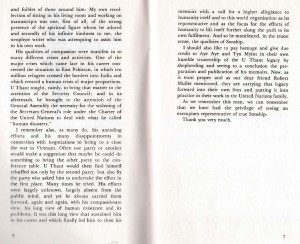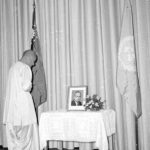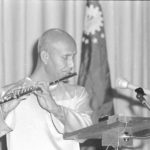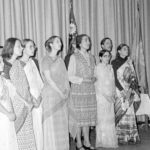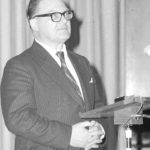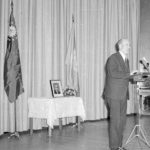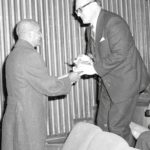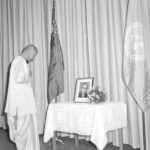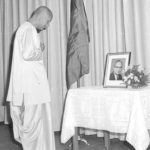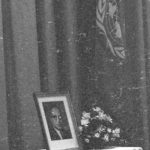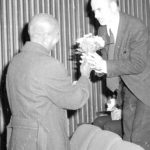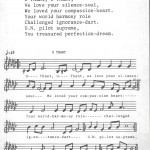Farewell to U Thant’s Family 1979 Mar 16
Filed under Tributes and Expressions of appreciationOn 16 March 1979 the Meditation Group bade farewell to U Thant’s family – his wife, Mrs. Thant, his daughter and son -in-law, Aye-Aye and Tyn Myint-U; and their four children.
Sri Chinmoy led silent prayer and Mr. Robert Muller, Secretary of the Economic and Social Council, and Mr. Donald Keys, President of Planetary Citizens, offered their reflections about U Thant and his family. Excerpts from the programme follow.
Sri Chinmoy Bows in respect for U Thant and the family:
Mr. Robert Muller, Secretary of the Economic and Social Council :
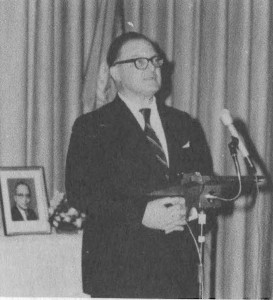 Dear friends. the ceremony tonight in honour of U Thant is also meant as a farewell to his family, which is leaving this weekend for Asia. It is a sad and at the same time a joyous occasion . It is sad because after their departure there will be no one left here in New York of U Thant’s family. He has left us already physically, resting as he is in a pagoda near the Great Golden Pagoda in Rangoon, Burma. Now his wife, his daughter, his son-in-law and his three grand children will be leaving us too. It is sad because as long as they were here and we could see them, talk to them and exchange cherished memories. we had the impression that U Thant had not completely left us.
Dear friends. the ceremony tonight in honour of U Thant is also meant as a farewell to his family, which is leaving this weekend for Asia. It is a sad and at the same time a joyous occasion . It is sad because after their departure there will be no one left here in New York of U Thant’s family. He has left us already physically, resting as he is in a pagoda near the Great Golden Pagoda in Rangoon, Burma. Now his wife, his daughter, his son-in-law and his three grand children will be leaving us too. It is sad because as long as they were here and we could see them, talk to them and exchange cherished memories. we had the impression that U Thant had not completely left us.
Koko, U T hant ‘s grandson , in particular reminded us very much of him : he looks like him and shows the same moral and intellectual inclinations as his grandfather. Their departure will therefore cause a great emptiness for all of us. On the other hand, it is a joyous occasion because Tyn Myint-U is joining the United Nations as a member of the Science and Technology Division of the Economic and Social Commission for Asia and the Pacific. A reputed mathematician and outer space scientist, he will henceforth contribute his talent to the United Nations and to meeting the needs of the developing countries of Asia.
I would like to pay a particular tribute to Mrs. Thant, who had a deep influence on U Thant. Reading some of the unpublished pages by our former Secretary-General, I discovered that it was she who encouraged him to come to the United Nations and to accept the position of Ambassador to the United Nations which had been offered to him. He wanted to think it over for several days but she exhorted him to accept forthwith, which he did the following morning. It is therefore in part to Mrs. Thant’s good advice that we owe our Secretary-Genera l. It was the same Mrs. Thant who, since U Thant’s death, had exhorted Tyn Myint-U to join the United Nations. He didn’t listen to her at first, but little by little he understood that this was the right place for him. I am sure that U Thant’s spirit must greatly rejoice at this moment that his son-in-law is joining the United Nations. Perhaps some day Koko too, who seems to have already his mind fastened on it, will become an international civil servant. U Thant ‘s family is a wonderful and united family, as are the families of all great people. We will miss them very much, but they have now joined the greater family of the United Nations. This is why tonight we should both be sad and happy, rejoicing also over the fact that Bangkok is only a few hours away from Burma, where the family will be a ble to visit the tomb of U Thant. So we should say to them with all our heart at the same time good bye and welcome to the United Nations family.
Since this is a ceremony in honour of U Thant, let me say that as the years pass, the greatness of our former Secretary-General becomes more and more universally recognised. Almost every week I receive writings, messages and visits of prominent people-philosophers, theologians, thinkers and sages – who are discovering U Thant or who have come across his message to the world, namely that we can not obtain peace by reason alone but that we must establish it by the proper relations between all peoples, proper relations with our planet, proper relations with the universe and proper relations with the totality of time, i .e ., a spiritual dimension. He repeated insistently that morality and spirituality had to catch up with scientific and technological advances. This is exactly what Pope Jean-P aul II said yesterday in his Encyclical in almost the same terms. As our little globe continues to spin in the universe, and as our first universal organisation discovers even deeper facets of our being in that universe, we feel year after year that U Thant was right, that he had grasped, well prepared by Buddhism, the totality of space and time and the place of each human being in both. This is probably the great message of spirituality that can encompass and unite the world . It is a message that speaks for all religions and all humanity. It is on that spirituality – namely, the total flowering of the human person on the Planet of God, in relations with each other, in the universe and in time – that finally a human society will be built blessed with peace, justice, kindness and happiness for all.
This was the simple but great message of U Thant. He knew that to achieve it, the most important way was education. Hence we must all become teachers. We must spread his message wherever we can. He dreamed of a United Nations University. It exists today. There is now a great upsurge around the world for what is called “global education.” Not a week passes for me without being invited to speak or to write about this subject, and always I present the deep and all inclusive message of U Thant, namely that proper education must be concerned with the four fundamental attributes of the human person: physical, mental, moral and highest of all, spiritual.
So, as his family leaves, perhaps our best gift to them is to pledge tonight our individual efforts to spread in every way we can U Thant’s message , to keep his memory alive, to live in the same way as he did – as a humble, gentle, warmhearted , compassionate and understanding man – and to tell those around us that in the highest world’s servant post on this planet, there was a wonderful man who has given a message which someday will be understood by the entire world and on which will rest the foundation of our future civilisation.
This message will stay with the United Nations and continue to inspire governments and the world. As we say farewell to his family, we ought to lock this message deep in our hearts and in our minds. Let me also say how much the U.N. Meditation Group meant for U Thant, He often deplored the a bsence of spirituality in world affairs. One day as he was sitting in a General Assembly meeting, he had this thought: “I felt that the General Assembly Hall of the United Nations had been the forum for statesmen and politicians, economists and sociologists. From time to time why should not this great hall be the forum for spiritual and religious leaders?”
This led him to invite Pope Paul VI to come to the United Nations and to deliver a major address to the General Assembly. At the United Nations the Meditation Group was the only active spiritual group. He came to see you and I know that he had great affection for you. It was in one of his meetings with you that he revealed his plans to write a major work on the need for spirituality and philosophy in world affairs. Alas, this second book which he had on his mind was never written because God took him away from us.
As we wish godspeed, good health and happiness to all the members of the U Thant family, let us pledge to uphold his spiritual message in our personal lives, in the United Nations and in the world.
* * * * * * * * * * * * * * * * * * * * *
Mr. Donald Keys, President, Planetary Citizens:
It is always a privilege for me to take part in this annual remembrance of U Thant, Indeed, he was our number one planetary citizen. I should like to speak briefly about him tonight in terms of my recollections of his Sonship – Sonship to his great Lord, the Buddha. His Sonship was visible in his emulation and manifestation of the quality of compassion the Bu ddhist precept of compassion for all sentient beings and the responsibility to assist them to their greater freedom, to their emancipation from what the Buddhists describe as the lower three worlds of Samsara or “illusion.” In all his actions and in all his activit ies, this was the main spring of U Thant’s qualities and characteristics – his endless patience , his kindness, his unending capacity for non-reaction to the follies and foibles of those around him. My own recollection of sitting in his living room and working on manuscripts was one, first of all, of the strong presence of the spiritual figure whom he adored and secondly of his infinite kindness to me, the neophyte writer who was attempting to assist him in his own work.
His qualities of compassion were manifest in so many different crises and activities. One of the major crises which came late in his career concerned the situation in East Pakistan, in which ten million refugees crossed the borders into India and which created a human crisis of major proportions. U Thant sought, vainly, to bring that matter to the attention of the Security Council; and in its aftermath, he brought to the attention of the General Assembly the necessity for the widening of the Secretary-General’s role under the Charter of the United Nations to deal with what he called “human disasters.”
I remember also, as many do, his unending efforts and his many disappointments in connection with negotiations to bring to a close the wa r in Vietnam. Often one party or another would make a suggestion that maybe he could do something to bring the other party to the conference table. U Tha nt would then find himself rebuffed not only by the second pa rty, but also by the party who asked h im to undertake the effort in the first place . Many times he tried. His efforts were largely unknown, largely absent from the public mind, and yet he always carried them forward, again and again, with his compassionate view, his long view of human existence and its problems. It was this long view that sustained him in his career and which finally led him to close his memoirs with a call for a higher allegiance to humanity itself and to this world organisation as its representative and as the focus for the efforts of humanity to lift itself further along the path to its own fulfilment. And so he manifested, in the truest sense, the qualities of Sonship.
I should also like to pay homage and give due credit to Aye Aye and Tyn Myint in their own humble trusteeship of the U Thant legacy by shepherding and seeing to a conclusion the preparation and publication of his memoirs. Now, as is most proper and as our dear friend Robert Muller mentioned, they are carrying that legacy forward into their own lives and putting it into practice in their work in the United Nations family.
As we remember this man , we can remember that we have had the privilege of seeing an exemplary representative of true Sonship.
Thank you very much.
* * * * * * * * * * * * * * * * * * * * *
Page images:
Gallery:
- Shraddha
- Shraddha
- Shraddha
- Shraddha
- Shraddha
- Shraddha
- Shraddha
- 1979-03-18-01-16-mar-sri-chinmoy-bow-uthant-photo-crp
- Shraddha
- Shraddha
- Shraddha
